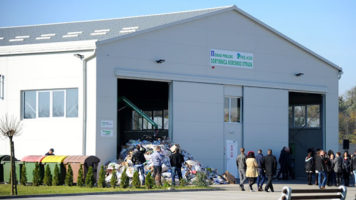Since 1st of November 2017, Town Ludbreg has started the implementation of the project “Development of Strategic Cross-border Cooperation between Letenye, Ludbreg and Prelog”, acronym “DESCO”, co-financed by Interreg VA Hungary-Croatia 2014-2020 Cooperation Program.
Within the framework of the project, it was necessary to hold a workshop strictly intended for employees of local governments from Hungary and Croatia In order to meet the project indicators on 8.th of May at 09.00 h a workshop entitled “Application of Information Communication Technology in Public Administration” in Ludbreg was held.
During the workshop, it was asked form the stakeholders to list the problems which public administration employees in Hungary and Croatia faced with. Despite a different legal system structures, territorial division and various functions that public employees carry on in their daily routines, listed problems are similar. Generally speaking, problems relate to the structure of public authorities, different methods of monitoring the implementation of work tasks in local government. As a problem, the difficulty of communicating between internal organizational units and between employees is also evident as predominantly used communication tools are e-mail tools and direct communication.
But if one goes into the definition of the particular situations that employees are encountering in their day-to-day tasks, then the number of problems increases considerably. Regardless of the country in which they work, Hungary or Croatia, employees are required to perform a number of work tasks from a variety of areas, such as drawing up draft decisions and other general acts, applying different legal regulations from different areas such as environmental planning, spatial and urban planning, municipal economy, social welfare, education and training, protection of the environment, traffic, culture and other activities assigned to the local government by special laws and national regulations.
According to the above mentioned circumstances, the following problems were detected:
- The problem of communication between employees working in different administrative departments or internal units in local government
- Each local government unit introduces or has its own internal employee tracking system
- High resistance of employees to the introduced changes and innovations
- Low motivation for further training of the staff in different areas, with the emphasis on lifelong learning
- Low motivation of employees
- Different units of Local Government are not cooperating and there is a low level of information and data exchange at local and central levels in each Country
- A large number of local government units in Croatia
- There are too many public institutions that are in charge of addressing the problems of citizens and they are not located directly next to each other
- Inability of individual units of local government to independently carry out all tasks within their competence in accordance with the law
- Low financial resources of the local government
- Given the different competences within a particular public administration, it is difficult to implement the same system of cooperation that would apply to all public bodies
- Inadequately prepared legal regulations regarding management and functioning of local governments
- Centralization of public administration is needed because different areas fall under the competences of different central government offices, which reduces efficiency and strengthens the administrative burden for the end user, ie citizens
- Insufficient participation of citizens in local decision-making and public policies
- Absence or insufficient vertical and horizontal cooperation between local self-government units, regional self-government units and central government units
- The lack of legal background for the normal functioning of the system, ie a lot of legal entities operates separately which leads to duplication of functions and work tasks which results with the slowdown of the whole process
- Incompatibility of particular sectors / systems in public administration at all levels (local, regional, central)
- Local level is low in the application of information and communication technology
The conclusion is that the solution to these problems has to be based on the “bottom up” approach, where instead of the needs of the central government and the state, the problems and needs of the local community have to come first. Important thing is that the main focus has to be put on the local community which equally consist from employees of local governments, representatives of various social organizations and citizens, or all those who are users of services provided by the local governments. And with the aim of improving the services that citizens receive, clear and direct guidance is needed either in the form of regulations or laws that will define the unique frameworks for the work of local governments and its employees in accordance with tasks they perform and obligations that they have towards citizens.
And with the aim of improving efficiency in providing services to citizens, it is necessary to monitor modern trends in the application of new technologies that are a very important tool for improving employee performance, as well as ways of managing work tasks, obligations and resources available to the executive person.
And in order for all of these items to be practically applicable, it is essential to carry out territorial reorganization of local and regional governments and to establish units that have sufficient capacity to adequately perform all the activities required by law and local needs of communities and citizens living in it.



